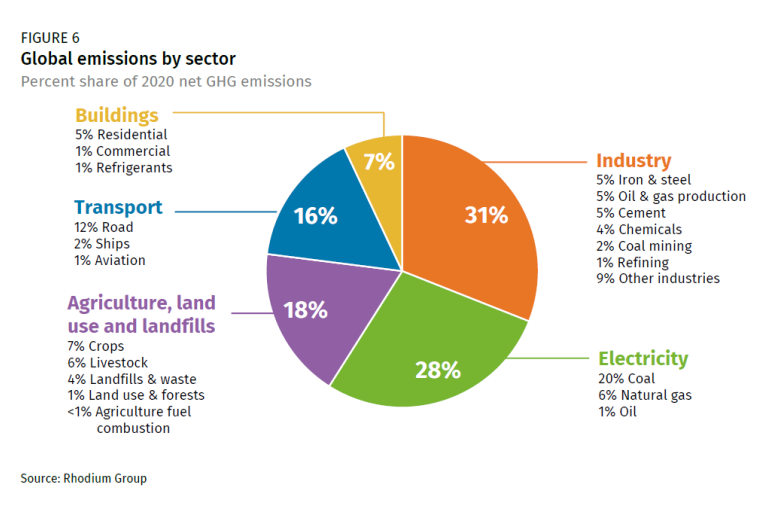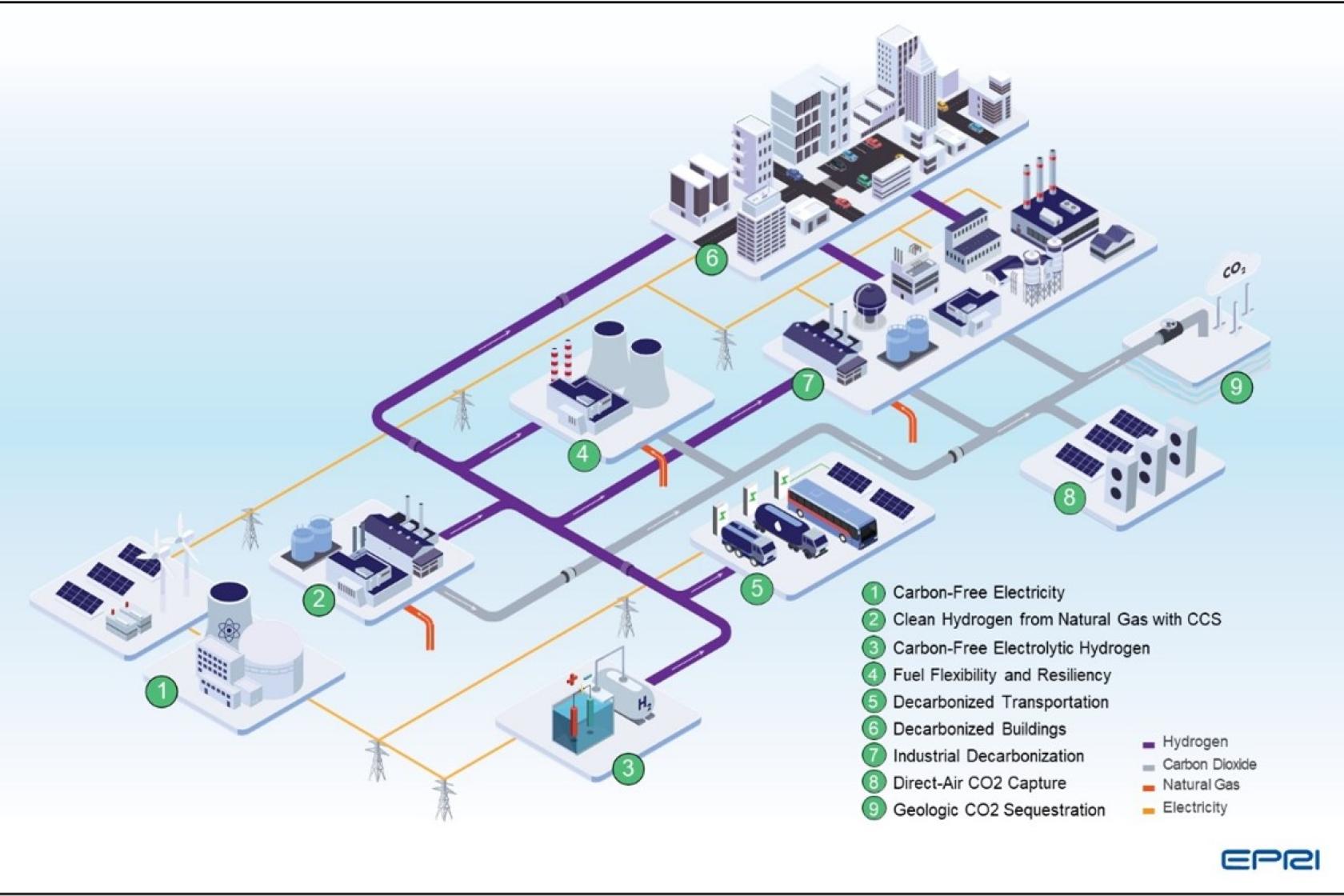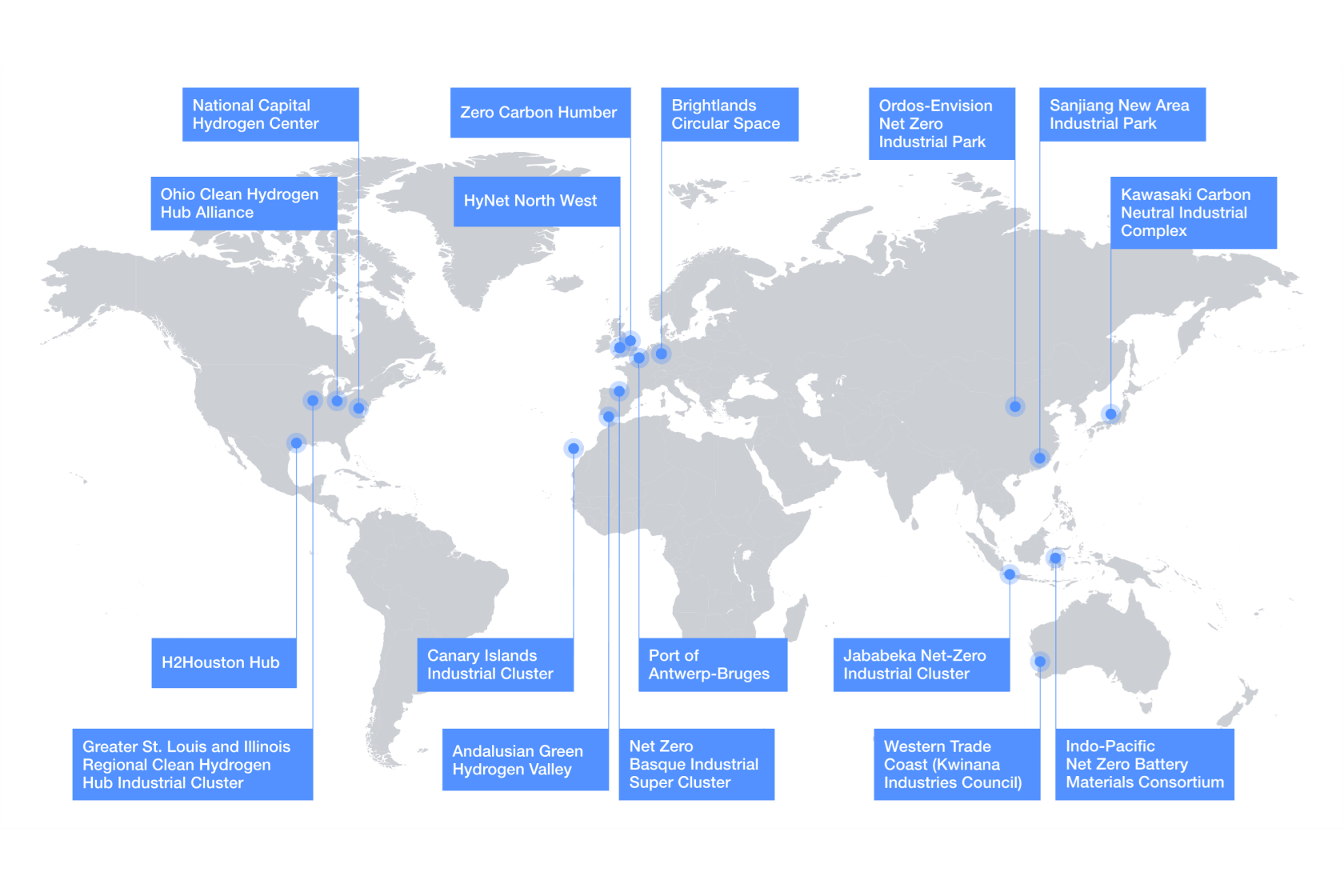July 26th, 2023
Chloe Fauvel
Welcome to The NZIC Blog!
This is the first in a series intended to cover specific decarbonization topics—each focusing on a specific aspect of net-zero industrial clusters (NZIC). Upcoming blog topics will include net zero studies, carbon capture utilization and sequestration (CCUS), environmental justice, circularity, coal plant site repurposing, and much more. These blogs are designed to inform anyone interested in NZICs, industrial stakeholders, energy companies, and community organizations.
We’re kicking off the series with NZICs 101. Keep reading to learn more.
The Context
Global policymakers, governments, and corporations are increasingly committing to timelines that achieve economy-wide net-zero carbon emissions. Getting to net zero is an economy-wide challenge, and every sector has a role to play.
At 31% of global emissions, the industrial sector is a significant source of greenhouse gas (GHG) emissions. Although some light industries, such as food or textiles, can turn to electrification or improved efficiency as decarbonization solutions, some heavy industries find electrification more challenging given the need for large amounts of process heat which fossil fuels have traditionally provided.
Despite recent strides made in the deployment of clean electricity supply, such as renewables, the power generation transition to low carbon will take time and must balance factors such as affordability, reliability, energy security and resiliency. Some segments of the transportation sector, such as heavy-duty trucking, aviation, rail, or shipping, are also facing challenges to decarbonize given the energy needed to transport large amounts of weight.
While a plethora of initiatives are dedicated to reducing emissions across each sector, they typically focus on a single technology or industry. By contrast, net-zero industrial clusters emphasize a regionally integrated, collaborative approach to decarbonization.

Figure 1. Global greenhouse gas emissions cover a wide range of end uses (2020 data). Source: Rhodium Group
What is a net-zero industrial cluster?
A net-zero industrial cluster (NZIC) is an ecosystem of businesses and industries located in the same geographic region, as well as public partners, that come together to collectively achieve net-zero emissions, while also stimulating local economic growth and job creation.

Figure 2. A net-zero industrial cluster collectively achieves net-zero emissions via the sharing of various resources and infrastructures.
So what differentiates NZICs from simply a group of co-located businesses and industries? It is the establishment of a collective decarbonization goal and vision, and formal partnerships between the cluster participants in pursuit of this vision. NZICs are developing decarbonization paths to net zero by considering a wide range of currently available and emerging technologies. These include electrification, energy storage, efficiency and circularity, hydrogen, ammonia, alternative fuels, and biomass, and CCUS.
Collaboration and regional effort
A key and novel aspect of these partnerships is the coordinated effort to build and establish common infrastructures. Think, a shared hydrogen storage and transport system or a dedicated solar + storage site for the cluster. The transition to net zero is likely to be capital intensive, especially for enabling infrastructure, which is estimated to require approximately $4.2 trillion in investment over the next 30 years, compared to an estimated $2.1 trillion for production assets. Partnering in a cluster enables the sharing of infrastructure development and operational costs among corporate and public partners.
Even in light of the importance of national-level net-zero commitments and supporting policies, implementation will occur at a regional level. Each region across the globe presents a unique mix of industries, infrastructure, resources, policies, and workforce – offering “optionality” for NZICs in a region. While a broad selection of technologies is available, not all of them may be cost effective or even feasible to implement in a given region. The regional focus on decarbonization is an important characteristic of NZICs to highlight. Optionality enables each industry and region to embark on a decarbonization path that is safest, most affordable, and equitable for their communities
Beyond GHG emission reductions, the path to net zero allows industrial clusters to consider solutions that bring maximum economic and social benefits to the region. Traditionally underserved communities can benefit from the transition to net zero, but the equitable distribution of costs and benefits requires deliberate planning. NZICs in the early stages of planning have the unique opportunity to involve the community in cluster formation, such as including the community in the earliest discussions, creating community benefits plans, and integrating community partners at every level of the cluster governance structure.
This formal, concerted effort to achieve net-zero emissions not only includes the private business and industries, but also partnerships with public entities in the region. This might include local government, non-profit organizations, the local workforce, and research and academia. Collaboration here helps the cluster reach its emission goals. Public-private cooperation is needed to optimize financing, overcome policy barriers, and increase the skill levels of the local workforce.
I've been hearing about hydrogen hubs…what is the difference?
"Hydrogen hub" is a term that is used by the US Department of Energy after the passing of the Infrastructure Investment and Jobs Act allocated $8 billion in federal grants to develop 6-10 hydrogen hubs across the US. A hydrogen hub is formally defined as "a network of hydrogen producers and consumers, and the connective infrastructure located in close proximity" and the term is mainly used within the US.
Vision versus reality
Developing, building, and operating a cluster will require integration of policy, processes, and infrastructure in ways that may be new to both regulators and business and industry. The diverse corporate cultures of the partners, as well as the need for new regulatory mechanisms, are challenges to overcome for a successful NZIC. Doing so will offer opportunities to create value by focusing on the design, integration and optimization of projects at a systems level.
Hydrogen hubs are essentially one flavor of NZICs focused on hydrogen as the technological solution. Though industry is often a key sector in the hydrogen hubs that are forming today, it does not necessarily have to be the central focus of the hub. Many hydrogen hubs in the US are focused on abating transportation-related emissions.
Without getting too wrapped up in the nuances, clusters and hubs are similar in concept: a coordinated effort to achieve a decarbonization goal for hard-to-abate sectors using a regional approach.
About the Initiative
To help drive NZICs forward, the World Economic Forum, in collaboration with Accenture and EPRI , has launched the Transitioning Industrial Clusters Towards Net Zero Initiative to help accelerate world-wide development of regional industrial decarbonization infrastructure to meet net zero targets, while also delivering on jobs, industrial competitiveness, and economic growth. The Initiative currently has 17 signatories and is working towards a target of 100 signatories by 2024.

Figure 3. Current signatories of the Transitioning Industrial Clusters Towards Net Zero Initiative. Source: World Economic Forum
About EPRI
Founded in 1972, EPRI is the world's preeminent independent, non-profit energy research and development organization, with offices around the world. EPRI's trusted experts collaborate with more than 450 companies in 45 countries, driving innovation to ensure the public has clean, safe, reliable, affordable, and equitable access to energy across the globe. Together, we are shaping the future of energy.
About WEF
The World Economic Forum is the International Organization for Public-Private Cooperation. The Forum engages the foremost political, business, cultural and other leaders of society to shape global, regional and industry agendas.
About Accenture
Accenture is a leading global professional services company that helps the world’s leading businesses, governments and other organizations build their digital core, optimize their operations, accelerate revenue growth and enhance citizen services—creating tangible value at speed and scale. We are a talent and innovation led company with 732,000 people serving clients in more than 120 countries. Technology is at the core of change today, and we are one of the world’s leaders in helping drive that change, with strong ecosystem relationships. We combine our strength in technology with unmatched industry experience, functional expertise and global delivery capability. We are uniquely able to deliver tangible outcomes because of our broad range of services, solutions and assets across Strategy & Consulting, Technology, Operations, Industry X and Accenture Song. These capabilities, together with our culture of shared success and commitment to creating 360° value, enable us to help our clients succeed and build trusted, lasting relationships. We measure our success by the 360° value we create for our clients, each other, our shareholders, partners and communities. Visit us at www.accenture.com.